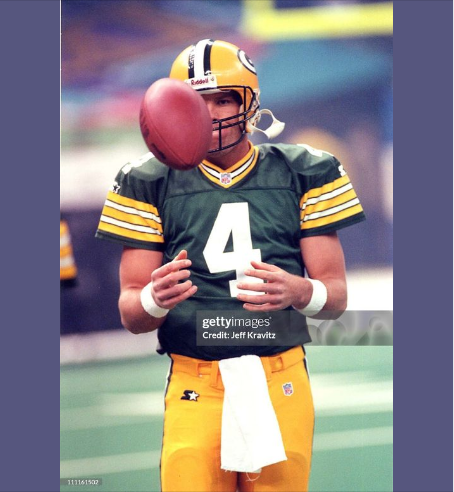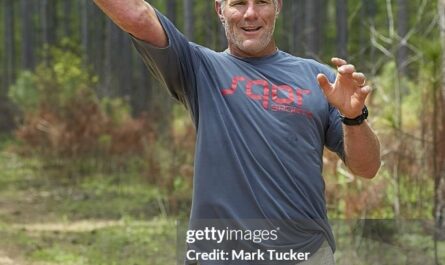Potential Self-Care Practices that Could Have Benefited Brett Favre’s Career
[bg_collapse view=”button-orange” color=”#4a4949″ expand_text=”Show More” collapse_text=”Show Less” ]
Brett Favre is widely considered one of the greatest and most durable quarterbacks to ever play in the NFL. From 1991 to 2010, Favre played an incredible 321 consecutive games, a record that still stands today. What’s perhaps most impressive is that he was still playing at a high level well into his 40s, defying the odds of longevity at the game’s most physically demanding position.
While Favre was known for his gunslinging play style and ability to improvise, there isn’t much public information available about the specific self-care practices he incorporated to maintain his health and enhance his performance over such a long career. Self-care for athletes is a more recent focus in sports training and recovery, and Favre’s career peaked in the 1990s before it became a bigger priority. However, we can look at general self-care strategies that may have potentially benefited Favre had he implemented them systematically throughout his career.
Maintaining a Healthy Diet
Proper nutrition is one of the most important forms of self-care for any athlete. The body needs sufficient fuel to perform at its best, recover efficiently, and avoid injury and burnout over a long season or career. A healthy, balanced diet tailored to an athlete’s needs and fueled by whole, nutrient-dense foods could have served Favre well.
As a quarterback, Favre relied heavily on his arm strength, accuracy, and ability to take hits—all of which require optimal muscle development and repair. A diet high in lean protein from sources like chicken, fish, eggs, and plant-based proteins would have supported this. Protein aids muscle protein synthesis after workouts to help muscles recover and grow stronger.
Complex carbohydrates from vegetables, fruits, whole grains, beans and lentils provide sustained energy for practices and games. Carbs spare muscle glycogen and spare protein from being used as an energy source. Keeping muscle glycogen stores high would have kept Favre energized on game days.
Healthy fats from foods like avocados, nuts, seeds and fatty fish are also important for brain and nervous system function. The quarterback position requires quick decision making, recall, and mental focus—all of which rely on adequate fatty acid intake. Fats also aid nutrient absorption and support hormone production for recovery.
Hydration with water and electrolyte replacement drinks would have kept Favre performing at peak capacity by hydrating his body and preventing cramping. Proper hydration also supports joint lubrication, cognitive function and thermoregulation during physical exertion.
Overall, a balanced, whole-foods diet tailored to Favre’s needs for muscle recovery, energy levels and brain function could have optimized his nutrition for peak performance throughout his long career.
Prioritizing Sleep
Another crucial form of self-care and recovery is adequate, high-quality sleep. For athletes, sleep allows the body and brain to rest and repair itself after the physical stresses of training and competition. It’s especially important for muscle recovery and cognitive functions like memory, focus and decision making—all of which were vital for Favre’s success as a quarterback.
National Sleep Foundation guidelines recommend 7-9 hours of sleep per night for adults. However, being an athlete at the elite level often conflicts with getting optimal rest due to travel, evening games, and adrenaline after competition. Favre would have benefitted tremendously from prioritizing sleep by going to bed early, limiting screens before bed, and establishing a relaxing pre-sleep routine.
Studies have shown that even partial sleep deprivation negatively impacts physical performance, reaction time, and risk of injury for athletes. It also hinders cognitive abilities like recalling plays. Getting sufficient, high-quality sleep would have been a simple way for Favre to optimize his recovery and mental sharpness night after night and season after season. This likely would have contributed greatly to his ability to sustain such a long, productive career in the NFL.
Recovery Techniques
In addition to nutrition and sleep, regular recovery techniques could have further aided Favre’s ability to bounce back and protect his body from overuse injuries over many seasons. Low-tech options like self-massage, foam rolling, and static stretching are effective for reducing muscle tightness and soreness. As an older athlete, these techniques would have been especially important for Favre.
Foam rolling and self-massage help break up muscle knots and adhesions, improving flexibility, range of motion and blood flow. They speed recovery by flushing out waste products from worked muscles. Regularly incorporating foam rolling and massage into his routine could have kept Favre’s muscles limber and joints mobile to withstand the physical demands of his position.
Static stretching keeps muscles long rather than tight. Tight muscles are more prone to strains and pulls. Gentle stretching after workouts and later in the day would have further supported Favre’s flexibility. Proper stretching form reduces risk of injury from sudden movements.
Regular recovery practices would have promoted continued mobility and durability for Favre’s body as he aged in the NFL. Simple self-care like massage, foam rolling and stretching can make a big difference for athletes competing year after year.
Mental Wellbeing Practices
Just as important as physical self-care is maintaining mental wellbeing as an athlete. The quarterback position requires immense pressure, focus and resilience to perform under stress week after week. Implementing mental wellness strategies would have likely benefitted Favre’s longevity and ability to cope with challenges over his lengthy career.
Meditation and mindfulness practices teach calm, focused awareness of the present moment rather than getting caught up in worries or self-criticism. Regular meditation likely would have improved Favre’s ability to stay centered under pressure and focus solely on the task at hand during intense games. Mindfulness also supports stress management, relaxation, and self-compassion—all valuable mental skills for athletes.
Progressive muscle relaxation is a type of meditation that involves alternately tensing and relaxing muscle groups to release physical tension and promote relaxation. Using PMR before bed or on rest days could have eased Favre’s mind and body into recovery mode more quickly.
Journaling provides an outlet for processing emotions, setting intentions, reflecting on successes and learning from mistakes. Pouring thoughts and feelings onto paper helps gain clarity and perspective that supports mental toughness. Favre may have benefited from regularly journaling his experiences.
Seeking counseling or life coaching when needed also normalizes the idea that everyone, including elite athletes, can benefit from talking through challenges objectively with a professional. Maintaining strong mental fitness through self-care practices would have likely helped Favre sustain his elite performance over such an unprecedentedly long NFL tenure.
In Conclusion
While we can only speculate how Brett Favre approached self-care privately, implementing consistent practices in areas like nutrition, sleep, recovery and mental wellness could have potentially optimized his physical and mental performance throughout his legendary career. Proper fueling, rest, injury prevention and stress management are especially important for athletes aiming for longevity at an elite level over many seasons or decades of play.
Favre was an iron man who defied expectations of durability in his position. With a more holistic and systematic approach to self-care integrated into his training from an early age, it’s reasonable to believe he may have sustained his Hall of Fame caliber play and durability for even longer than he did. The strategies discussed provide a framework athletes of any era could follow to enhance recovery and prolong their prime. Brett Favre’s incredible career serves as an inspiration for what focused commitment and toughness can achieve, with or without optimized self-care practices.
[/bg_collapse]



